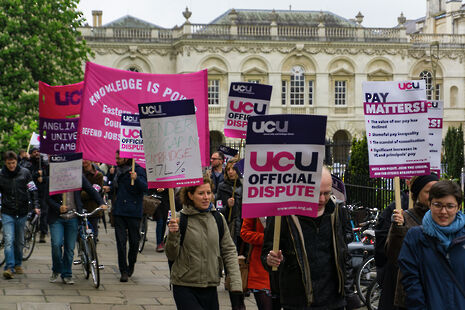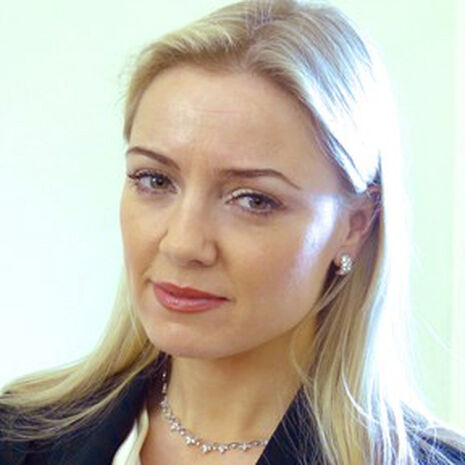Cambridge UCU raises casualisation concerns ahead of annual meeting
An investigation which found that Cambridge employed relatively few casual workers has come under criticism on several fronts

On the eve of their Annual General Meeting, the Cambridge branch of the Universities and Colleges Union (UCU) has spoken out against insecure contracts.
It follows a report in The Guardian two weeks ago, which claimed that a smaller proportion of University of Cambridge lecturers are employed on insecure contracts than at any other university in the Russell Group.
The category of ‘insecure contracts’, sometimes called ‘atypical contracts’, covers a range of short-term work agreements, the most extensive of which offer just nine months of employment. Some offer no more than one hour’s marking or teaching at a time.
The Guardian found that just 13.4 per cent of lecturers at the University of Cambridge were employed on insecure contracts, some 7.8 percentage points below Imperial College London, which employs the second-lowest proportion of lecturers on such contracts within the Russell Group.
The accuracy of the report has been called into question by the University of Warwick, who claimed that The Guardian got their figures “really, really badly wrong” after failing to differentiate between ‘atypical’ and ‘fixed-term contracts’.
This criticisms were echoed by the University of Nottingham, who said the article was “misleading and inaccurate”, and had been contrived upon “seriously flawed” data handling.
Cambridge’s UCU branch, which has led the charge against insecure contracts in the University, also disputed the figures on a different basis. They said that despite Cambridge’s apparently strong result, there remain problems inherent in the University’s employment structure.
Sam James, Cambridge UCU Research Staff Representative, said he was ‘encouraged’ by the figures, but noted that the supervision system meant that a lot of workers are missing from the statistics because they are not formally employed by the University.
James criticised such contracts, saying that the uncertainty of securing future employment was a considerable source of anxiety for many, and that “for some, this can have serious adverse effects on mental health”
He said the contracts “limit the ability of many temporary lecturers fully to devote their energies to their present teaching and research commitments, since they must necessarily spend considerable time researching and applying for other jobs.”
The UCU, whose two-day strike in May of this year was partly called to draw attention to casualisation, will meet for its annual general meeting on November 29, at which Jonathan White of the national UCU will be speaking on the issue.
Commenting on The Guardian’s report, UCU general secretary Sally Hunt said: “Many universities are hacking up teaching jobs into ever smaller bits and shoving people on to the worst contract they can get away with. This is the Sports Direct model imported into our universities.”
“When academic staff are demoralised and forced to cope with low pay and insecurity, the knock-on effect on students is significant”
Sorana Vieru, NUS VP (Higher Education)
Many have also argued that insecure contracts are detrimental to the quality of university education. At the UCU’s annual conference in April, Hunt said: “a teacher's working conditions are the same conditions that a student learns in. When you don't have an office, or proper time to mark papers, and when you spend every waking hour looking for your next research job, that really matters.”
The NUS has raised similar concerns. Sorana Vieru, the organisation’s vice-president (Higher Education), has warned that “When academic staff are demoralised and forced to cope with low pay and insecurity, the knock-on effect on students is significant”.

Nonetheless, the contracts do have their defenders. The organisation representing university employers, the Universities and Colleges Employers Association, has claimed that the contracts allow universities “to operate with part of their workforce in a flexible mode to enable them to respond to changes in demand”.
James acknowledged that in some circumstances – “such as where a permanent faculty members is on leave, or for an early-career research position” – temporary contracts might be appropriate, and that for this reason “it is difficult to give a general view on the ideal proportion of temporary contracts”.
The Director General of the Russell Group, Dr Wendy Piatt, said of the investigation: “Staff welfare is, of course, a priority for our universities and is always taken into account when contracts and terms of employment are offered. However, universities require levels of flexibility that reflect changes in student enrolment, popularity of courses and the expansion of research projects.
“To assume all staff involved in teaching through atypical or fixed term contracts are on so-called ‘zero-hours’ contracts is misleading. Visiting lecturers, expert consultants or industry professionals who add greatly to the research-led teaching at our universities would be on such contracts. These additional voices in our universities provide insight that the students value highly, but would not wish to take on full-time typical contracts within a higher education institution.”
The contracts are most common at the University of Birmingham, where 70.3 per cent lecturers are subject to them. The University of Oxford employs the fourth-highest proportion, at 63.7 per cent of staff. Across the country, more than one half of all lecturers are employed on these kinds of contracts.
The University of Cambridge did not respond to a request for comment.
 News / Uni Scout and Guide Club affirms trans inclusion 12 December 2025
News / Uni Scout and Guide Club affirms trans inclusion 12 December 2025 News / Pembroke to convert listed office building into accom9 December 2025
News / Pembroke to convert listed office building into accom9 December 2025 Features / Searching for community in queer Cambridge10 December 2025
Features / Searching for community in queer Cambridge10 December 2025 News / Uni redundancy consultation ‘falls short of legal duties’, unions say6 December 2025
News / Uni redundancy consultation ‘falls short of legal duties’, unions say6 December 2025 News / Gov declares £31m bus investment for Cambridge8 December 2025
News / Gov declares £31m bus investment for Cambridge8 December 2025








